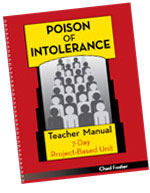Poison of Intolerance

DESCRIPTION OF PROJECTS
“The Field Trip” - Activity #1
In The Field Trip activity, students will be taken on a virtual field trip, blindfolded, and unaware where they are headed. They will be taken to a very large public daycare playground, still blindfolded, and asked to describe what and who they expect to see once their blindfolds are removed. The consensus will be that they will observe young children, approximately ages 1-4, playing together on the playground.
The students will then be asked if they expect all of the young children, who are playing together, to be the same – same age, same race, same religion, same intellect, same socio-economic class, same height, same abilities? Once the students conclude that the children will all, more than likely, be very different in many ways, the students will be asked to explain the phenomena. Why, if these children are so very different, in so many ways, are they all playing together out on the playground? The desired conclusion of the students would be that the children are all playing together on the playground due to one overriding factor – these children are not intolerant yet.
The goal of this awareness unit is to convince students that intolerance is, in fact, a learned behavior and, as such, can and must be unlearned.
“Four Corners” - Activity #2
The Four Corners activity is designed to provide students with an effective strategy for un-learning intolerance. In this high energy, collaborative activity students be directed to specific corners of the classroom, based on particular preferences in a variety of categories, including music, automobile, and interests. As the students move to and from “corners” they will become aware of others who share similar interests in any number of categories. Once students learn how to focus on such similarities, rather than differences, between each other they will begin to develop the skills needed to unlearn intolerance. The ability to focus on similarities requires listening skills, questioning skills, critical thinking, and problem solving – skills that must be learned, and only improve with practice.
“The Normalizer” - Activity #3
The Normalizer activity is a self-assessment exercise that enables students to attempt to establish a reasonable list of criteria that would represent, in the students’ minds, what a picture of ‘normal’ might look like. Through this eye-opening activity, students come to understand that, no matter how convinced they may otherwise be, there is really no such thing as ‘normal’. With this new found knowledge, students can begin the process of recognizing and accepting differences in others in all walks of life – at home, in school, and ultimately, in the workplace.
“What If” - Activity #4
This powerful awareness activity will introduce students to a plethora of possibilities for which they will need to be prepared prior to entering the world of work. Through previous activities, students should now have a keen awareness and understanding of the differences that will exist between them and those with whom they will associate in the future. The What If activity will bring that understanding much closer to home, as students are asked to personally consider the real possibilities and likely probabilities that they will be working with and/or for people who are very unlike themselves. Preparation for that reality will be the difference, for most students, between success and struggles when they hit the real world.
EMAIL CHAD | ORDER FORMS | DOWNLOAD BROCHURES
For more information please send email to chadwfoster@att.net or call (706) 342-9189.

